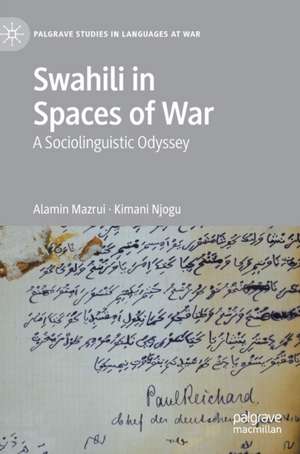Swahili in Spaces of War: A Sociolinguistic Odyssey: Palgrave Studies in Languages at War
Autor Alamin Mazrui, Kimani Njoguen Limba Engleză Hardback – 29 apr 2023
Din seria Palgrave Studies in Languages at War
- 15%
 Preț: 644.18 lei
Preț: 644.18 lei - 15%
 Preț: 643.34 lei
Preț: 643.34 lei -
 Preț: 389.70 lei
Preț: 389.70 lei -
 Preț: 385.62 lei
Preț: 385.62 lei - 15%
 Preț: 645.79 lei
Preț: 645.79 lei - 15%
 Preț: 588.04 lei
Preț: 588.04 lei -
 Preț: 336.14 lei
Preț: 336.14 lei -
 Preț: 386.99 lei
Preț: 386.99 lei - 15%
 Preț: 641.71 lei
Preț: 641.71 lei -
 Preț: 388.90 lei
Preț: 388.90 lei - 15%
 Preț: 587.53 lei
Preț: 587.53 lei - 18%
 Preț: 728.28 lei
Preț: 728.28 lei - 15%
 Preț: 636.45 lei
Preț: 636.45 lei - 18%
 Preț: 887.55 lei
Preț: 887.55 lei - 18%
 Preț: 945.62 lei
Preț: 945.62 lei - 18%
 Preț: 953.03 lei
Preț: 953.03 lei - 18%
 Preț: 727.00 lei
Preț: 727.00 lei
Preț: 727.48 lei
Preț vechi: 887.18 lei
-18% Nou
Puncte Express: 1091
Preț estimativ în valută:
139.21€ • 145.71$ • 115.86£
139.21€ • 145.71$ • 115.86£
Carte tipărită la comandă
Livrare economică 31 martie-14 aprilie
Preluare comenzi: 021 569.72.76
Specificații
ISBN-13: 9783031273377
ISBN-10: 3031273370
Pagini: 232
Ilustrații: IX, 232 p. 2 illus.
Dimensiuni: 148 x 210 mm
Greutate: 0.44 kg
Ediția:2023
Editura: Springer International Publishing
Colecția Palgrave Macmillan
Seria Palgrave Studies in Languages at War
Locul publicării:Cham, Switzerland
ISBN-10: 3031273370
Pagini: 232
Ilustrații: IX, 232 p. 2 illus.
Dimensiuni: 148 x 210 mm
Greutate: 0.44 kg
Ediția:2023
Editura: Springer International Publishing
Colecția Palgrave Macmillan
Seria Palgrave Studies in Languages at War
Locul publicării:Cham, Switzerland
Cuprins
Chapter 1: Introduction.- Chapter 2: Swahili and the Maji Maji Resistance against German Rule.- Chapter 3: Swahili and African Military Formation: Between WWI and WWII.- Chapter 4: Swahili and Imperial Britain: Colonial Creation/African Appropriation.- Chapter 5: Swahili and the Conflicts of the Great Lakes Region.- Chapter 6: Swahili and the Cold War.- Chapter 7: Swahili and the War on Terrorism in the Post-Cold War Period.- Chapter 8: Conclusion.
Notă biografică
Alamin Mazrui is Professor at Rutgers University, USA. He has authored and edited several books and written numerous articles in sociolinguistics, education, literature, and culture. He has a special interest in human rights and civil liberties and has written policy reports on these subjects. He is also a published Swahili poet and playwright.
Kimani Njogu holds a Ph.D in linguistics from Yale University (1994). He is the Executive Director of Twaweza Communications, Nairobi, and serves in the Kiswahili Commission at the African Academy of Languages (ACALAN), an organ of the African Union. His research interests revolve around language, culture and society.
Kimani Njogu holds a Ph.D in linguistics from Yale University (1994). He is the Executive Director of Twaweza Communications, Nairobi, and serves in the Kiswahili Commission at the African Academy of Languages (ACALAN), an organ of the African Union. His research interests revolve around language, culture and society.
Textul de pe ultima copertă
This monograph examines the roles and functions of Swahili in war/conflict situations, and the impact of wars on the destiny of the language. Covering a period of over a century, the monograph explores this sociolinguistic theme in the context of six wars/conflicts: the Maji Maji resistance against German rule, the two World Wars, the anti-colonial resistance to British colonialism, the wars of the Great Lakes region, the cold wars, and the ongoing war against terrorism. In geographical focus, some of the war situations explored here are “local,” others are “transnational,” and others still rather “global” in scope and ramifications. In the final analysis, the monograph provides important snapshots of the conflict-based history of the Swahili language, demonstrating once again that language is a malleable tool that can be appropriated and galvanized to serve the interests of either party in a conflict and sometimes as a means of creating hegemonic and anti-hegemonic meanings.
Alamin Mazrui is Professor at Rutgers University, USA. He has authored and edited several books and written numerous articles in sociolinguistics, education, literature, and culture. He has a special interest in human rights and civil liberties and has written policy reports on these subjects. Mazrui is also a published Swahili poet and playwright.Kimani Njogu holds a Ph.D in linguistics from Yale University (1994). He is the Executive Director of Twaweza Communications, Nairobi, and serves in the Kiswahili Commission at the African Academy of Languages (ACALAN), an organ of the African Union. His research interests revolve around language, culture and society.
Caracteristici
Captures the changing contours of a language caught between parties in conflict Traces the role of Swahili as a language in conflict zones over a century of East Africa Argues that language as a malleable tool can be used in conflict to create meanings and counter-meanings
